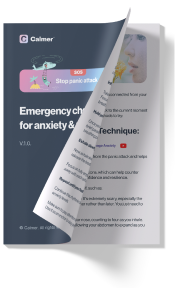We are all too familiar with that sensation. You are going about your day normally when suddenly it feels like someone knocked the wind out of your lungs. Your heart’s beating out of your chest and you feel like you can’t breathe. Anxiety is simply not a state of extreme worry; it can manifest as a whole range of physical symptoms.
Among these, the most common complaint is chest pain. It’s easy to mistake chest pain as a sign of a serious condition, prompting many people to rush to the emergency room. However, there’s no need for such measures.
If you want to know how to relieve chest tightness from anxiety, keep reading.
Symptoms of Anxiety Chest Pain

Recognizing chest pain from anxiety can be challenging. Symptoms of anxiety-related chest pain can vary from person to person. Some individuals describe it as a crushing weight, while others experience it as a dull, aching pain.
Despite the range of signs, you can still recognize chest pain caused by anxiety by observing the following symptoms:
- Sharp pain in the chest
- Continuous chest tightness
- Stabbing pressure
- Muscle ache in the chest
- Dull pain
- Numbness in chest
Given the similarity of symptoms, some people may mistake chest pain from anxiety as a heart attack. Although chest pain from anxiety can manifest the same way, there are still a few key differences that can help you tell the two apart.
Chest pain from a heart attack can be accompanied by two or more of the following symptoms:
- Pain radiating to the lower jaw, left shoulder, and arm
- Nausea
- Difficulty breathing
- Worsening chest pain on exertion
What Causes Anxiety Chest Pain?

Anxiety often rises because of a hormone called adrenaline. Normally, your body maintains a consistent level of adrenaline in the bloodstream. However, during an anxiety attack, there’s an overactivation of the system responsible for producing the hormone. This excess adrenaline causes most symptoms of anxiety.
It can make your heart pump faster and your sweat glands produce more sweat. Additionally, adrenaline can cause your muscles to tense up. When this tension occurs in the chest muscles, it can result in chest pain.
Ways to Treat Anxiety Chest Pain

The key to treating anxiety chest pain is to treat the underlying cause. Here are different ways you can reduce anxiety and manage chest pain.
Deep Breathing

Source: Diversus Health
Deep breathing is the easiest way to regain control of your emotions. Focused breathing has been clinically proven to calm anxiety. There are several deep breathing methods available online. However, the simplest way is to lie down in a comfortable position.
You can also sit down or go to a quiet place where you can focus on your breathing. Next, inhale for the count of four, and hold your breath for the count of four. Follow it up by exhaling for the count of four and then holding your breath again for the count of four. Repeat this until you feel better. The chest pain should disappear as you do.
Mental Health Apps
Mental health apps can be valuable in alleviating symptoms of anxiety. These apps come equipped with a range of therapeutic tools available at your fingertips, providing immediate help in a distressful situation. If you feel your chest tightening because of anxiety, open a mental health app.
The right app will come with the feature to calm down during an ongoing anxiety episode. You can navigate between different breathing exercises and guided meditation sessions. Users are free to choose whichever method they want, provided it calms them down.
Exercise
Exercise can also help with chest pain. When you experience chest tightness, consider moving around. You can go for a walk, or do a couple of jumping jacks. The idea behind this approach is to burn off excess adrenaline in your body.
This way you can go back to feeling normal. Moreover, exercise also promotes the release of anti-anxiety chemicals in the body which also helps soothe chest pain.
When to Go to A Doctor?
Although your chest pain should resolve with the above-mentioned remedies, it’s crucial to go to a doctor if the pain persists. Your doctor can prescribe you anti-anxiety medication to reduce such episodes or refer you to a psychotherapist for Cognitive Behavioral Therapy and other effective anxiety treatments.
You can also book an appointment in case your symptoms appear unassociated with anxiety or are accompanied by any signs pointing to a heart attack.
Conclusion
Summing it up, experiencing chest pain with anxiety is perfectly normal. The pain can appear differently for different individuals. However, the approach to treating anxiety-associated chest pain remains the same. You can look into deep breathing exercises or do some light physical activity.
Downloading a mental health app can also prove to be beneficial in mitigating symptoms of chest tightness. The important thing to remember is that the chest pain won’t last for long. You will be better able to manage your symptoms as you explore different treatment options.
FAQs
How do you loosen a tight chest from anxiety?
You can loosen a tight chest from anxiety with the diaphragmatic breathing method. Lie down flat in a comfortable position. Place one hand on your belly and the other on your chest. Breathe in while the hand on your belly moves up. Breathe out while the hand on your belly moves down. Repeat this until you have calmed down.
How long can anxiety chest tightness last?
Anxiety chest pain can last for minutes to hours. The duration varies depending on the severity of your anxiety attack. Although alarming, symptoms will subside once your nerves have settled.
Why do I feel heavy in my chest?
You can feel heavy in your chest for several different reasons. Leading causes include anxiety, cardiovascular issues, respiratory problems, chest infections, and digestive issues. Additionally, heart attacks are often accompanied by chest heaviness.




